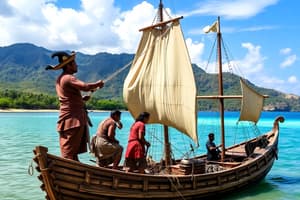Podcast
Questions and Answers
What was the main platform of President Rodrigo Duterte during the 2016 presidential elections?
What was the main platform of President Rodrigo Duterte during the 2016 presidential elections?
- Economic liberalization
- Promoting environmental sustainability
- Enhancing educational opportunities
- Reducing crime by killing criminals (correct)
Who initiated the attempt to introduce amendments to the Constitution concerning economic provisions during President Aquino III's administration?
Who initiated the attempt to introduce amendments to the Constitution concerning economic provisions during President Aquino III's administration?
- Rodrigo Duterte
- Congress members as a whole
- Feliciano Belmonte Jr. (correct)
- Benigno Aquino III
What form of government is President Duterte a supporter of?
What form of government is President Duterte a supporter of?
- Unitary system
- Democracy
- Federalism (correct)
- Dictatorship
Which president had no marked interest in charter change during their administration?
Which president had no marked interest in charter change during their administration?
What was the primary aim of the amendments concerning economic provisions that were proposed during President Aquino III's administration?
What was the primary aim of the amendments concerning economic provisions that were proposed during President Aquino III's administration?
What task did President Duterte assign by signing an executive order in December 2016?
What task did President Duterte assign by signing an executive order in December 2016?
From President Duterte's background, what influenced his support for federalism?
From President Duterte's background, what influenced his support for federalism?
Study Notes
Historical Significance of Limasawa
- Limasawa is associated with the first Christian mass in the Philippines.
- No archaeological relics or balangai traditions have been found in Limasawa.
- The western explorers valued the abundance of gold in Mazaua as a significant currency during their time.
Gold and Archaeological Findings
- Agusan Valley is noted for its archaeological relics and active gold mines, highlighting its wealth of gold resources.
Evidence Supporting Limasawa Claim
- Albo’s Logbook: Provides substantive evidence of the events in question.
- Pigafetta’s Testimony:
- Described the expedition’s route through key locations.
- Map created by Pigafetta supports the claim.
- Included detailed accounts of interactions with two native kings.
- Provided insights on seven days spent in Mazaua.
- Argument from omission highlights absence of mention for Butuan despite its relevance.
Pigafetta’s Detailed Account
- March 16, 1521: Sighted “high land” now known as the Marianas Islands.
- March 17, 1521: Landed on uninhabited island “Humumu,” now Homonhon; stayed there for eight days.
- March 25, 1521: Departure from Homonhon marked by an incident involving Pigafetta.
- April 1, 1521: Magellan sent men to assist local kings with harvest.
- April 4, 1521: Departure from Mazaua to Cebu.
Argument from Omission
- Critical analysis of Pigafetta's account suggests Mazaua cannot be Butuan since there’s no mention of the Agusan River, a key feature of Butuan's geography.
Confirmatory Evidence from Legazpi Expedition
- Survivors of Magellan's expedition likely visited Butuan post-Magellan's death.
- Pigafetta described encounters with the queen in Butuan, providing additional context to the expedition's findings.
Philippine Independence Movement
- Biac-na-bato Convention (1897) led to the adoption of a constitutional framework aimed at independence.
- Malolos Constitution (1899): Established the First Philippine Republic; focused on justice, welfare, and sovereignty.
- Highlights of the Malolos Constitution:
- Emphasis on the sovereignty of the people.
- Included natural rights and popular sovereignty.
- Addresses separation of Church and State in response to Spanish friar influence.
U.S. Legislative Actions and Independence
- Hare-Hawes Cutting Act (1932): Proposed independence but faced opposition from Manuel L. Quezon.
- Tydings-McDuffie Act (1934): Established a path for formal independence, allowing for the drafting of a constitution.
- 1935 Commonwealth Constitution:
- Aimed to create a government for independence, justice, liberty, and democracy.
- Established a bicameral Congress, influenced by various global constitutions.
- Ratified by President Roosevelt, marking a stride toward Philippine independence.
Studying That Suits You
Use AI to generate personalized quizzes and flashcards to suit your learning preferences.
Description
Explore the various evidences supporting Limasawa as the site of the first mass in the Philippines, including Albo's Log-book and Pigafetta's testimony. Learn about the lack of significant archaeological relics or balangai tradition in Limasawa, and the excitement of western explorers over the abundance of gold in Mazaua.




